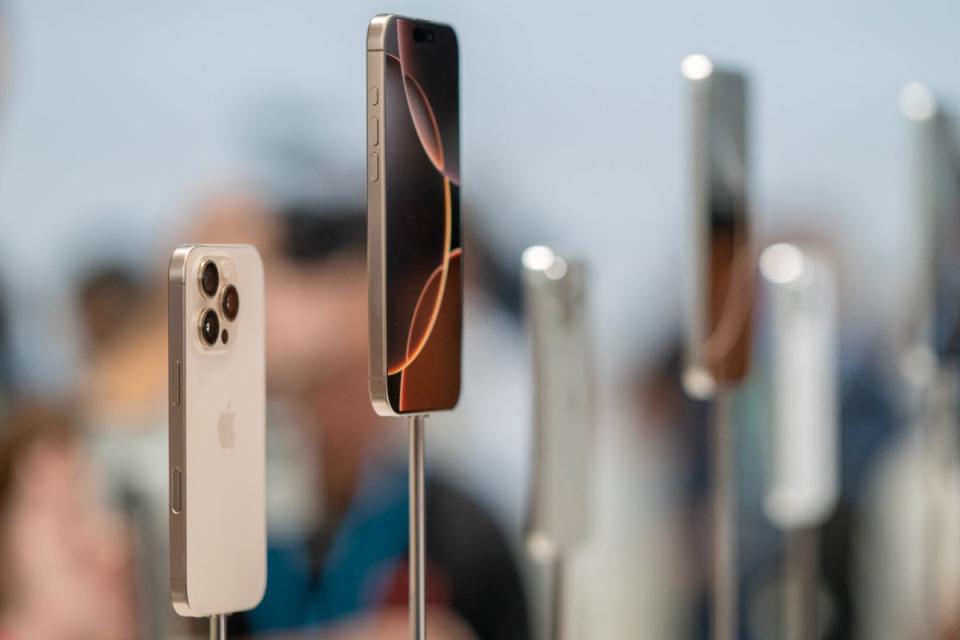iPhone 16 and Pro: Apple reveals new phone with more buttons – and loads of AI features

Apple has revealed its iPhone 16 and 16 Pro, with a new focus on artificial intelligence.
The new device includes a host of features, including a new “camera control” on the side that can be used to call up and then adjust the camera. Its display and battery have also expanded.
But the main focus for Apple appeared to be artificial intelligence – or Apple Intelligence, as the company has called it. Though it showed off new AI tools such as summaries of messages and the ability to generate and edit images in June, the new phone is the first hardware product to be sold with a specific focus on AI.
“The next generation of iPhone has been designed for Apple Intelligence from the ground up. It marks the beginning of an exciting new era,” Chief Executive Tim Cook said at a product launch.
As with recent years, the iPhone 16 is actually four phones: a Pro and non-Pro version, in two different sizes. The Pro includes improved cameras and different materials, and both the larger and smaller sizes also expanded.Speaking at the event to unveil the new devices, Apple chief executive Tim Cook said these were the first iPhones to be designed “from the ground up for Apple Intelligence” and that the new “personal intelligence system” would have a “profound impact” for users.
“The innovation and invention these products deliver will continue to deepen the meaningful impact they have on all of our lives,” Mr Cook said.
“I’m proud of our teams and what they’ve accomplished and I can’t wait for you to experience these amazing products.”
The AI-powered tools use “personal context” to provide help, Apple said, for example offering edits to writing or notes made in almost any app, or being able to quickly find a specific photo or moment within a video based on a typed description.
The tools can also be used to find specific emails, flight details and other personal information instantly, as well as offer email summaries and prioritise certain notifications and enable users to create their own emoji or new image.
The tech giant confirmed the new devices would go on sale on September 20, with Apple Intelligence tools rolling out in a software update later.
Ben Wood, smartphone expert and chief analyst at CCS Insight, said although Apple had not entirely shaken the perception that its phone launches were becoming more low-key, its new AI tools were still eye-catching.
“There is a growing feeling that smartphone updates have become a bit boring. Apple is not immune to this trend and is betting on software and AI to breathe new life into its most important product to reignite consumer interest and drive upgrade purchases,” he said.
“As expected, Apple Intelligence features will roll out progressively over the next few months and years. However, at present, a notable exclusion is the EU, where Apple is in a stand-off over compliance with the Digital Markets Act.
“We will be watching closely to see how European consumers react to missing out on the new Apple Intelligence features and whether it affects demand for the iPhone 16.
“We note with interest that Apple Intelligence will be available in the UK - which, since Brexit, falls outside the EU. Historically Apple has treated the region with a consistent approach since the UK’s departure from the trade bloc so this is a notable change.
“Many of the features being offered by Apple Intelligence, such as summarising emails and editing photos, are similar to those previously showcased by Google and Samsung.
“However, as it has done in the past, Apple put a heavy focus on privacy as a differentiator - this aligns well with CCS Insight’s research, which indicates that despite the enthusiasm for AI, about 43% of UK consumers surveyed expressed concerns about privacy and data security.”
Fellow smartphone expert Ernest Doku, from Uswitch.com, agreed that the AI tools were the main notable change in an otherwise incremental iPhone update.
“Last year’s iPhone launch left some a little disappointed by Apple’s strategy of ‘evolution not revolution’, and many feel that Android devices have pulled ahead in the last 12 months,” he said.
“Apple’s latest launch may not have entirely changed this perception, but there are still some innovative features worth calling out on its new flagship smartphone. Although the new camera updates and Camera Control button are impressive, the biggest development is the new handsets’ Apple Intelligence compatibility.
“This unique delivery of deep AI integration into every aspect of the phone ensures Apple’s refresh can keep pace with key features touted at recent releases of Google’s Pixel and Samsung’s Galaxy devices alike.
“An exciting development is Apple’s focus on personal data security when it comes to using generative AI, with nothing shared with Apple while using Apple Intelligence. This could set its AI technology apart, as consumers continue to prioritise their digital privacy.”
Elsewhere, the technology giant unveiled the redesigned and update Apple Watch Series 10, which will include the ability to detect sleep apnea for the first time.
In addition, a software update to the firm’s existing AirPods Pro 2 will enable wearers to use them as a clinical-grade hearing aid.
Additional reporting by agencies

 Yahoo Finance
Yahoo Finance 